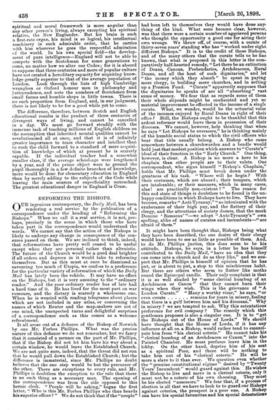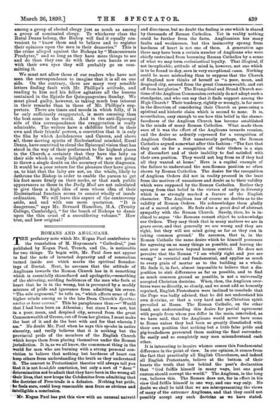REFORMING THE BISHOPS.
OUR ingenious contemporary, the Daily Mail, has been rendering a real service by the publication of a correspondence under the heading of "Reforming the Bishops." When we call it a real service, it is not, per- haps, precisely in the sense in which those who have taken part in the correspondence would understand the words. We cannot say that the action of the Bishops is likely to undergo any change in consequence of the cen- sures passed on them. We are inclined to think, indeed, that reformations have pretty well ceased to be useful except when they are personal rather than altruistic. The future of the Church would be a good deal brighter if all orders and degrees in it would take to reforming themselves. But as this must at once be dismissed as savouring too much of 'Utopia, we confess to a preference for the particular variety of reformation of which the Daily Mail has lately been the vehicle. It may have no effect on the Bishops, but it is very amusing to the "ordinary reader." And the poor ordinary reader has of late had a hard time of it. He has lived for the most part on war rumours, and the dietary is scarcely a wholesome one. 'When he is wearied with reading telegrams about places which are not included in any atlas, or concerning the names of which Reuter and the map-makers are not of one mind, the unexpected turns and delightful surprises of a correspondence such as this comes as a welcome refreshment.
It all arose out of a defiance of the Bishop of Norwich by one Mr. Forbes Phillips. What was the precise nature of this defiance we do not remember, but we fancy that it consisted of a menace on the part of Mr. Phillips, that if the Bishop did not let him have his way about a certain window, he would leave the Established Church. We are not quite sure, indeed, that the threat did not run that be would pull down the Established Church ; but the difference is immaterial, since Mr. Phillips no doubt believes that the one step would he but the precursor of the other. There are exceptions to every rule, and Mr. Phillips is doubtless the exception to the rule that there is no such thing as a necessary man. The opening of the correspondence was from the side opposed to this heroic clerk. "People will be asking," began the first letter, "'Who is this liIr. Forbes Phillips who thus beards his superior officer ? " We do not think that if the "people" had been left to themselves they would have done any- thing of the kind. What soon became clear, however, was that there were a certain number of aggrieved persons who thought the opportunity a good one for airing their own wrongs. We throw off, of course, with a curate of thirty-seven years' standing who has "worked under eight different Bishops." It is to the credit of these Bishops, and of the many others that the curate tells us he has known, that what is proposed in this letter is the com- paratively half-hearted remedy, "Let there be an extinction of Deans, Canons, Prebendaries, Archdeacons, Rural Deans, and all the host of such dignitaries," and let "the money which they absorb" be spent in paying more clergy, in building more churches, and in setting up a Pension Fund. "Curate" apparently supposes that the dignitaries he speaks of are all " absorbing " vast sums of money. We fear that as regards some of them their whole stipends might be confiscated and yet nc material improvement be effected in the income of a singh curate. What, we wonder, would be the actuarial vain( of the incomes enjoyed by Rural Deans in right of their office ? Still, the Bishops ought to be thankful that this ardent reformer would leave them in possession of their dioceses. We cannot, however, help thinking that when he says "Let Bishops be overseers," he is thinking mainly of the humble social status to which the civil officers who bear that title usually belong. A Bishop who came somewhere between a churchwarden and a beadle would hold just that modest position which answers to " Curate's" ideal of their function in the" Early Church." One thing, however, is clear. A Bishop is no more a hero to his chaplain than other people are to their valets. One correspondent, who signs himself "Bishop's Chaplain," holds that Mr. Phillips must break down under the greatness of his task. "Where will he begin With their costumes, which are absurd ; their tempers, which are intolerable ; or their manners, which in many cases, alas ! are practically non-existent ? " The reason for this sad state of things is doubtless to be found in the un- happy conditions in which Bishops have to live. They have become, remarks "Anti-Tyranny," "so intoxicated with the exuberance of their high pay, and the flattery of their clergy, and the attentions of society dames, that the meek Domine Samsons' "—we adopt " Anti-Tyranny's " own spelling, alike of names of curates and incumbents—" are afraid of them."
It might have been thought that, Bishops being what they have been described, the one desire of their clergy would have been to see as little as possible of them. And, to do Mr. Phillips justice, this does seem to be his attitude. Bishops, he says, in a letter he has himself contributed to the Daily Mail, "have an idea that they can come into a church and do as they like," and we sus- pect that Mr. Phillips is himself of opinion that he has put, or is about to put, a stop to this mischievous habit. But there are others who seem to flutter like moths round the Episcopal candle. Their only complaint is that it is so well shaded by "some clerical humbug of an Archdeacon or Canon" that they cannot burn their wings when they wish. This is the grievance of "A London Curate." "Many a worthy vicar," he says, "or even curate remains for years in misery, feeling that there is a gulf between him and his diocesan." Why in misery ? we are tempted to ask. Why this ostentatious preference for evil company ? The remedy which this gentleman proposes is also a singular one. It is to "get the Bishops out of the House of Lords." We should have thought that the House of Lords, if it has any influence at all on a Bishop, would rather tend to emanci- pate him from "his clerical coterie." He cannot take his "clerical humbug of an Archdeacon or Canon" into the Painted Chamber. He must perforce leave him in the lobby. On the other hand, deprive him of his seat as a spiritual Peer, and there will be nothing to take him out of his "clerical coterie." He will be more a slave to it than ever. We question even whether the "genuine constitutional regime" desired by "Twenty Years' Incumbent" would guard against this. He wishes the Bishop to live and move in a clerical coterie, only it must not be a coterie of his own choosing. They must be his elected "assessors." We fear that, if a process of election is all that we have to look to to guard our Bishops against coteries, the prospect is a poor one. A Bishop can have his special favourites and his special deteatatams
among a group of elected clergy just as much as among a group of nominated clergy. To whichever class the Rural Deans belong, the Bishop will find it equally con- venient to "know them and to believe and to register their opinions upon the men in their deaneries." This is the crime alleged against the Bishops by " 3Iancuniensis Presbyter," and, so long as they have more things to see and do than they can do with their own hands or see with their own eyes they will probably go on com- mitting it.
We must not allow those of our readers who have not seen the correspondence to imagine that it is all on one side. On the contrary, there are many very sensible letters finding fault with Mr. Phillips's attitude, and reading to him and his fellow agitators all the lessons contained in the Epistle for Quinquagesima Sunday. We must plead guilty, however, to taking much less interest in their remarks than in those of Mr. Phillips's sup- porters. There are times and moods in which folly, if it be only sufficiently exaggerated, is more amusing than the best sense in the world. And in the anti-Episcopal side of this correspondence the exaggeration is really admirable. The writers have a childlike belief in their own and their friends' powers, a conviction that it is only the film by which Archdeacons and Canons, and above all, those moving spirits of Ecclesiastical mischief, Rural Deans, have contrived to cloud the Episcopal vision that has stood in the way of their preferment to the highest places in the Church, a certainty that they have the laity on their side which is really delightful. We are not going to throw a single doubt on the accuracy of their diagnosis. It would be a poor return for the pleasure they have given us, to hint that the laity are not, on the whole, likely to dethrone the Bishop in order to enable the parson to get his foot more firmly on their necks, or that such public appearances as those in the Daily Mail are not calculated to give them a high idea of men whose idea of their Ecclesiastical function seems to consist wholly of insub- ordination. We will leave this aspect of the controversy aside, and end with one more quotation. "It is dangerous," says Mr. Bernard Hamilton, M.A. (Trinity College, Cambridge), "for the bench of Bishops to dance upon the thin crust of a sniouldering volcano." How true, and how original !







































 Previous page
Previous page